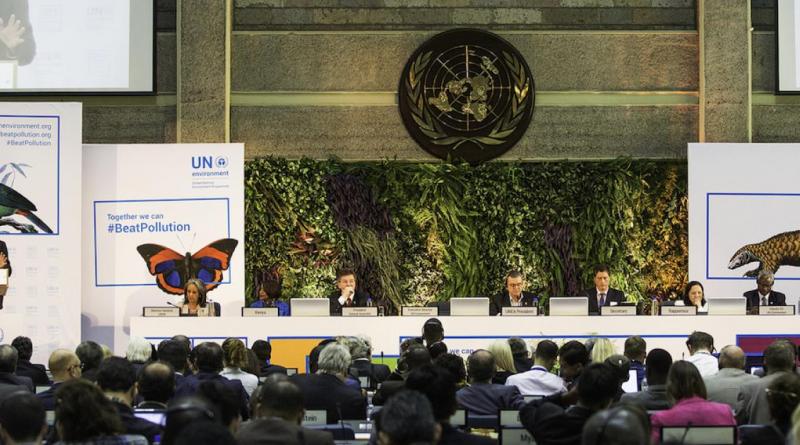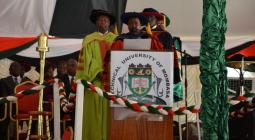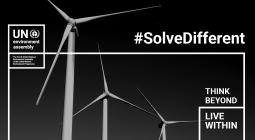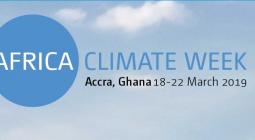4th UN Environment Assembly: Speeches at the Opening plenary.

Speeches from Mr. Siim Kiisler, President of the fourth UN Environment Assembly and Ms. Joyce Msuya, Acting Executive Director of UN Environment.
1.OPENING PLENARY FOURTH UN ENVIRONMENT ASSEMBLY STATEMENT BY THE ACTING EXECUTIVE DIRECTOR
MARCH 11, 2019 | TIME: 10:00 AM | VENUE: Conference Room 2
Honourable Minister Siim Kissler, Minister of Environment for Estonia and President of the fourth UN Environment Assembly
My colleague, Maimunah Sharif, Acting Director General of UN Office in Nairobi and Executive Director of UN Habitat
The Honourable Minister of Environment of the Republic of Kenya, Keriako Tobiko
Excellencies, Ladies and Gentlemen
Please allow me to begin by expressing our condolences to the victims and all those affected by the Ethiopian airlines crash yesterday. You are all in our thoughts this week.
Welcome to the Fourth United Nations Environment Assembly or as we say in Kiswahili: Karibu kwenye Bunge la Nne la Umoja wa Mataifa
We are here today because we share a common sense of purpose.
We can no longer delay taking action to protect people and this planet.
And the good news is that around the world, there are many examples of people, governments, enterprises and civil society that are not willing to wait to change our collective future.
In Cameroon, farmers use solar-powered driers to dry cassava crop. This means they can store what they produce for longer and get a better price in the market. In the Philippines, a textiles startup collects waste and transforms them into footwear and fashion accessories. And in Sri Lanka, affordable electric conversion kits aim to transform the iconic tuk tuk. So we’re not starting from scratch.
These innovations challenge the very basis of how we treat our planet. We can no longer grow now, and clean up later.
We have reached the planet’s limits and we have the power to do so.
Excellencies, Ladies and Gentlemen,
It is clear that we need to transform the way we live, how we produce and the choices we make.
We have grown at the expense of nature and it is time to take a 360 degree u-turn.
And we have compelling science that lays out the urgency with which we must act.
Last year, the Intergovernmental Panel on Climate Change released a report saying that we must quickly and drastically reduce our climate-warming emissions. A few weeks later, UN Environment’s Emissions Gap Report concluded that, in order to avoid a rise of more than 1.5°C in global temperatures, we need to step up climate action five times.
So what could this transformation look like?
One, we need to move quickly to a low carbon, green economy that by 2050, reduces fossil fuel use by 80%.
Two, it is time to be kinder to the environment in how we produce food, reducing the environmental impact of food production by two thirds.
Three, we need to achieve a near- zero waste economy by 2050. Circularity must be the driving force of the future we want.
This week, thousands of us are gathering here in Nairobi. Your commitment sends a strong signal that we can achieve these ambitions. The presence of almost 100 ministers of the environment demonstrates that political will is not in short supply. Partnerships will be the glue that bind us together because a healthy planet depends on us all.
Innovation will be the heartbeat of the transformation we want and this cannot happen by itself. Policies and incentives to spur innovation and sustainable consumption and production must be backed by efforts to build implementation capacity.
And I am so proud that we will have many civil society organizations, governments, social enterprises and companies here at the Assembly who will be demonstrating the power of innovation in reducing poverty, powering businesses and achieving sustainable development.
The appetite to change the way we live and consume does exist. UN Environment Programme’s Solve Different campaign aims to inspire us to change the choices we all make in our daily lives and I am excited to report that we have already recorded more than 2.7 million positive choices aiming to reduce the environmental costs of consumption and production models.
More than 4000 delegates from 170 countries will be at the Assembly this week. I challenge you all to join the global push and share your commitments using the Solve Different hashtag and I look forward to reporting our progress on March 15.
I ask us all to be open, optimistic and bold. And to focus on the end goal – which is to ensure the collective well-being of all people on this planet.
To close in the words of the UN Secretary-General: “In this fast changing world, standing still means falling further behind.”
So let’s move ahead!
Thank you. Asanteni sana
2.Excellencies, Distinguished delegates, Colleagues, Ladies and Gentlemen
Ms. Joyce Msuya, Acting Executive Director of the United Nations Environment Programme
Ms. Maimunah Mohd Sharif, acting Director-General of UN Office in Nairobi and Executive Director of UN-Habitat
H.E. Mr. Keriako Tobiko, Minister of Environment of the Republic of Kenya
Karibu to magical Kenya!
I sincerely thank the Eastern European Group for nominating me as the President and trusting and supporting me throughout the Presidency.
I would like to express my condolences to those who have lost loved ones in the crash.
It is my great pleasure to welcome you all to the fourth session of the United Nations Environment Assembly.
We are in the middle of a historic stage in the life of the United Nations Environment Programme. Over the past 47 years, this organisation has brought opportunities to build on the strong commitments and dedication of our collective efforts. In 2022 we are celebrating 50 years of UNEP and 30 years of Rio conference. This will give us a special reason to take pride and stock of progress made in the future global environmental agenda.
I would like to pay tribute to the Secretariat of the organization, both past and present, for their tireless efforts in assisting Member States at a critical time for action to protect and reverse the degradation of our planet.
My most sincere appreciation goes to Ms. Joyce Msuya, the Acting Executive Director, for her leadership, commitment and resolve to strengthen this organization, to look to the future with pride, and for setting the basis to build a bright future for the environmental pillar of sustainable development.
I would also like to welcome Ms. Inger Andersen, Director-General of the International Union for the Conservation of Nature, who has been appointed as the next Executive Director of United Nations Environment Programme. Ms. Andersen, as President of the Environment Assembly, and on behalf of Member States, I look very much forward to working with you to ensure that this organization goes from strength to strength, in order to become a more agile, effective and robust organization that is able to quickly respond to the most pressing environmental challenges seen in generations.
Distinguished delegates,
At this Assembly, we are focusing on how to consume and produce sustainably and on innovative solutions to address environmental challenges. Even more than anywhere, results in global environmental policy can only be achieved in collaboration. Evidence shows that we need to strengthen our efforts collectively and urgently.
We meet at a time when major scientific assessments such as the Global Environment Outlook GEO-6 to be endorsed at this Assembly are highlighting that we have reached a crucial tipping point. A major species extinction, compromising planetary integrity and Earth’s capacity to meet human needs, is unfolding and mega-trends are being established. Our planet is increasingly polluted, affected by the adverse effects of climate change, quickly losing its biodiversity and experiencing widespread environmental degradation.
Indeed, the last 4 years have been the warmest years on record. We have all become too familiar within our countries with news about flash floods, droughts, violent hurricanes, sand and dust storms, all of them accompanied by tragic loss of human lives.
Unless we take action now, we will not be able to reverse these mega-trends, thereby protecting human and environmental health and maintaining current and future integrity of global ecosystems. Consequently, many of the Sustainable Development Goals will not be met.
Dear Colleagues,
As President of the United Nations Environment Assembly, my vision is to scale-up the efforts to overcome common environmental, including health related challenges in a balanced and integrated manner through identifying and developing innovative solutions. In the light of these challenges, there is an urgent need to take action on sustainable and efficient resource management; international environmental data and engagement of civil society, citizens, private sector and academia.
2 billion people worldwide lack access to solid waste collection services. 64 million people are directly affected by uncontrolled dumping and open burning at dumpsites. 8 million tons of plastics enter the ocean every year. In the draft ministerial declaration, I am asking Member States to define ambitious national targets for reducing waste generation, increasing the reuse of products and recycling of waste and to significantly reduce single-use plastic products by 2030.
The world needs openly accessible data, information, analysis, knowledge and science to better inform and guide what needs to be done to achieve sustainability across all environmental dimensions. With the ministerial declaration, I am asking UNEP to develop a global environmental data strategy by 2025 and Member States to improve national environmental monitoring systems and technologies. Not only is data filling knowledge gaps, data can also be a source of economic benefits which cannot be left unnoticed.
Finally, our efforts must benefit people. An outcome from this Assembly must speak to each and every country and inspire citizens to become more aware of the challenges and solutions to the health of our planet, and embark on more sustainable lifestyles. We need to find innovative solutions for environmental challenges through different approaches to sustainable consumption and production, inspiring nations, private sector players and individuals.
In conclusion, this Environment Assembly embodies the notion that challenges are best addressed and opportunities realized when the community of nations and citizens of the world join forces to promote economic prosperity, social equity, and environmental sustainability in a holistic manner.
Friends,
We have before us a heavy agenda with many important decisions to make. I urge all of us to engage positively and openly in the deliberations. Upon our shoulders lie immense responsibilities to move towards sustainable and resilient societies.
I count on each and every one of you to ensure that our discussions over the next five days take place in a spirit of commitment, understanding and common goal. You would not be here unless you -- like me -- were convinced that we need to take action now to protect our planet and people. I look forward to your cooperation and working with you at this United Nations Environmental Assembly to deliver on the expectations of the international community.
Thank you.
Attached are the videos of the opening speeches:
11 March 2019
UN ENVIRONMENT





